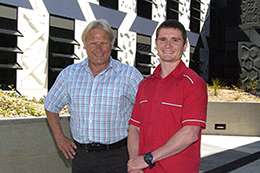Cracking the epigenetic code, advancing our understanding of disease

(Medical Xpress)—A team of researchers at The Australian National University is one step closer to better understanding how organisms function after discovering how epigenetic information is transmitted from one generation of cells to the next.
Lead researcher, Dr David Tremethick from The John Curtin School of Medical Research, said developing a better understanding of these epigenetic processes has significant potential implications for human health, in particular the treatment and prevention of diseases such as cancer.
The findings have been published in a new paper on the Nature Structural & Molecular Biology website today.
Epigenetics is the new frontier of genetic science. Epigenetic mechanisms go beyond DNA-stored information to provide an additional layer of information that controls when and where genes are expressed. It determines which fraction of the 20,000 genes that make up the human genome come into play to ensure the right genes are expressed in the correct cell type. This epigenetic information must be passed down through generations or 'inherited' in order for cells to function properly throughout our lives.
"We know cells are regenerating all the time and that epigenetic information must therefore be continually restored, the question is how this actually happens," Dr Tremethick said.
"Our study focused on this important unanswered question by investigating how epigenetic information is restored following the cellular division of stem cells, which is essential for their renewal.
"Using mouse stem cells as a model system we found that the inheritance of epigenetic information, how information is passed along, was much more dynamic and unstable than we expected.
"From a health perspective, this has both positive and negative consequences. On the one hand, this instability opens up the possibility of information being corrupted as it is passed from cell to cell, causing disease. On the other, it points to the potential of one day being able to intervene in the process to correct corrupted information or stop it being passed on to another generation.
"The next step is to understand how this epigenomic information is naturally altered to allow the proper transition from a stem cell to a lineage-committed cell that occurs during human embryo development. This, in turn, will allow a better understanding of how this inheritance process goes wrong in diseases such as cancer."
Dr Tremethick said the latest breakthroughs in technology in sequencing DNA has allowed a revolution in the field of epigenetics, in which the John Curtin School of Medical Research has become a major international player.
"We look forward to achieving more positive results from our research program and contributing to global advances in this cutting-edge field of epigenetics," he said.



















